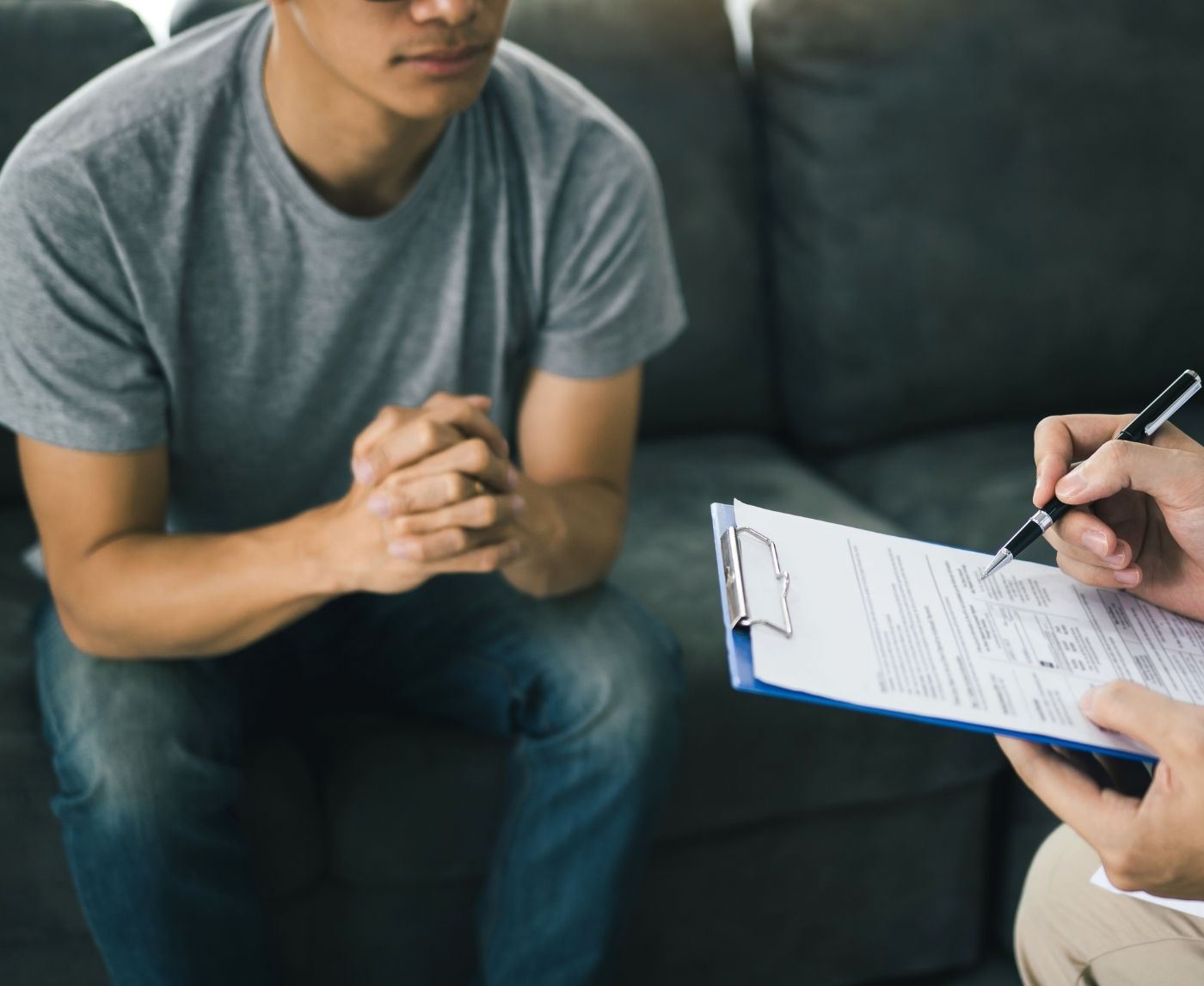Private and Accurate: How At-Home Test Kits Are Changing Sexual Health
Why STD Testing Triggers So Much Anxiety
There’s a reason STD testing stirs up emotional chaos, even for the most responsible, well-informed adults. At its core, sexual health testing taps into shame, vulnerability, and uncertainty all at once. That’s a volatile emotional mix.
The Fear of the Unknown
Most people aren’t scared of the needle or the swab. They’re scared of what might be found. It’s not just the idea of having Herpes, HIV, or Chlamydia, it’s what that diagnosis might mean for your identity, relationships, or sense of safety. You’re not just waiting for test results. You’re waiting for a verdict.
Shame + Stigma = Panic
We’ve been conditioned to see STDs as proof of recklessness or “dirtiness,” even though the truth is they’re incredibly common, and often caught during completely consensual, condom-protected sex. That cultural messaging doesn’t just disappear in the testing room. It echoes in your brain while you’re refreshing your email or avoiding eye contact with your partner.
Loss of Control
Unlike most health issues, STDs tie directly to your intimacy and past choices. And waiting for results can make you feel helpless. The results are out of your hands, but the fear feels crushingly immediate.

People are also looking for: Can stress delay STD test results?
The Physical Symptoms of Mental Stress Post-Test
STD test anxiety isn’t just emotional. It can mess with your body too. Some people experience what clinicians call “psychosomatic symptoms,” real physical sensations triggered by stress, not infection.
- Symptom: Burning or itching , Often mistaken for Herpes or Trichomoniasis, but sometimes just irritation + stress.
- Symptom: Fatigue , Chronic stress after testing can drain your energy, mimic flu-like feelings.
- Symptom: Sleep disruption , Racing thoughts or fear spirals can lead to insomnia or night sweats.
- Symptom: Loss of appetite or nausea , Common during high cortisol spikes caused by fear of bad news.
It’s okay if your body is reacting. The brain-body connection is real. What matters is recognizing the source and grounding yourself.
How Long STD Results Take, and Why That Time Feels Endless
Some tests return within 24 hours. Others take up to two weeks. Here’s a general guide:
- Rapid HIV test: 20 minutes to 1 day
- Chlamydia and Gonorrhea: 2–4 days
- Syphilis: 4–7 days
- Herpes (blood test): 5–10 days
- Full panel or mailed kits: 3–10 days, depending on the lab
But emotionally? Even one day can feel like a year. According to a study in the Journal of Health Psychology, people waiting for STI results reported higher anxiety scores than those undergoing cancer screenings. Why? Because sexual health panic is intensely personal and tied to social stigma.
Check Your STD Status in Minutes
Test at Home with Remedium7-in-1 STD Test Kit

 For Men & Women
For Men & Women Results in Minutes
Results in Minutes No Lab Needed
No Lab Needed Private & Discreet
Private & DiscreetOrder Now $129.00 $343.00
For all 7 tests
Coping Strategies While You Wait
There’s no magic fix for test anxiety, but there are strategies that can help soften the spiral. It’s about redirecting your brain, calming your body, and reminding yourself of reality (not the nightmare in your head).
Grounding Tactics
- 5-4-3-2-1 Technique: Name 5 things you see, 4 you can touch, 3 you hear, 2 you smell, 1 you taste, bring yourself out of the panic.
- Limit Google: Every rash on Reddit looks like Syphilis. Set a timer if you’re symptom-searching.
- Talk to someone: A therapist, a friend, even a sexual health hotline can offer perspective.
Know the Odds
According to the CDC, 1 in 5 Americans has an STI, most are treatable. Herpes? Manageable. Chlamydia? Often cured with one dose of antibiotics. Testing isn’t a trap, it’s a way out of uncertainty and into clarity.
Expert Insight: Why the Wait Feels Worse Than the Diagnosis
Ask most clinicians, and they’ll tell you: the waiting period is when they see the most distress. According to Dr. Rachel Kim, a sexual health specialist in Chicago, “About 70% of my patients report anxiety after the test but before the result. It’s not the STD they fear, it’s what it might mean for how they’re seen.”
This anticipatory anxiety is well-documented in psychological research. A 2021 article in the journal Psychology & Health found that individuals awaiting STD results reported higher stress biomarkers than those who had received a positive result and begun treatment. The uncertainty is often worse than the reality.
That’s why education matters. Understanding what’s common, what’s curable, and what your next steps are, no matter the outcome, can significantly lower your cortisol response. Knowledge doesn’t just protect your body. It shields your nervous system, too.
The Role of Guilt, Regret, and Relationship Fear
STD anxiety doesn’t exist in a vacuum. It’s tangled in personal history, sexual decision-making, and often, deep fear about how others will respond. Even people in long-term monogamous relationships sometimes spiral into guilt if they suspect they’ve exposed their partner unknowingly.
Here’s the truth: shame is a social invention. But STDs are biological, not moral. You didn’t “deserve” it. You’re not “dirty.” You’re human. And whether your fear stems from a one-night stand or a partner’s past, your emotions are real, but they’re not proof of danger.
When Regret Becomes Rumination
Regret after sexual decisions is common, but ruminating (“What if I ruined everything?”) just feeds the spiral. Instead, ask yourself: “What would I tell a friend going through this?” That’s the voice you need to hear right now.

People are also looking for: Is it normal to feel sick while waiting for results?
Case Study: “I Lost It Waiting for My Results”
Kayla, 28, got tested for a full STI panel after a condom break during a casual hookup.
“The test took five minutes. But the next ten days were the worst of my life. I cried in the shower. I Googled myself into a full panic. I convinced myself I had HIV even though the doctor said the risk was low.”
Her results came back negative. But the emotional impact lingered.
“It made me realize I didn’t have great emotional tools for managing uncertainty. I wasn’t scared of being sick, I was scared of being judged.”
Her takeaway?
“Now I test more often, I’m more honest with partners, and I try not to catastrophize every symptom. It’s hard, but I’m better at catching the spiral early.”
Sexual Health Clinics vs. At-Home Testing: Which Is Easier on Mental Health?
Some people feel reassured by in-person testing with direct guidance. Others find clinics triggering due to past trauma, gender discomfort, or fear of judgment. In that case, at-home testing may feel safer, and saner.
At-home STD kits like the Complete STD Home Test Kit Package allow you to collect your sample in private and ship it off without sitting in a waiting room staring at posters about Hepatitis C.
But here’s the catch: the emotional wait still exists. So wherever you test, make a plan for the “after.” That might mean scheduling a therapy session or telling a friend to check in. Because it’s not just about knowing, it’s about caring for yourself while you wait to know.
Why Some People Ghost After Testing, Even Themselves
If you’ve ever delayed picking up results or ghosted your clinic, don’t beat yourself up. It’s a common trauma response. Avoidance is a brain strategy to delay perceived danger. Unfortunately, that delay just feeds the fear.
Instead of avoiding, try writing down your fears. Seeing them on paper often deflates their power. Are you afraid of Herpes? Write down what you think that diagnosis means. Then research what living with Herpes actually looks like (spoiler: it’s not the end of your dating life).
Also, recognize that many STDs are asymptomatic. Waiting for symptoms isn’t safer, it’s riskier. Action, even when you're scared, is usually the only way out of the fear spiral.
Check Your STD Status in Minutes
Test at Home with Remedium6-in-1 STD Rapid Test Kit

 For Men & Women
For Men & Women Results in Minutes
Results in Minutes No Lab Needed
No Lab Needed Private & Discreet
Private & DiscreetOrder Now $119.00 $294.00
For all 6 tests
Common Myths That Make Waiting Worse
Most of the fear people feel while waiting for STD results doesn’t come from facts, it comes from myths. These outdated or exaggerated beliefs can intensify shame, worsen anxiety, and even delay testing altogether. Let’s debunk a few:
- Myth: Only “promiscuous” people get STDs. STDs don’t care how many partners you’ve had. Many are spread in monogamous or long-term relationships.
- Myth: If you don’t have symptoms, you’re fine. Chlamydia, HPV, and even HIV can all be asymptomatic for long periods. No symptoms ≠ no risk.
- Myth: A positive result means your sex life is over. Most STDs are manageable or treatable. People with Herpes and HIV have active, happy, healthy sex lives.
- Myth: You’ll know immediately if something’s wrong. Window periods exist for every STD. Some infections won’t show up on a test until days or even weeks later.
The more you know, the less power fear has. Busting these myths is step one in protecting not just your health, but your peace of mind.
How to Talk to a Partner While You’re Waiting
This one’s tricky. If you’re dating someone new or seeing someone casually, you might not know whether to bring them into your post-test emotional storm. But silence can add to your anxiety.
If You’re in a Relationship: Be honest. Let them know you got tested, why it matters to you, and that the waiting period is bringing up emotions. It’s okay to ask for support.
If It Was a One-Time Encounter: You don’t owe every hookup a play-by-play of your emotional state. But if you think they could be at risk, disclosure is part of harm reduction. Say something like:
“Hey, just a heads-up, I got tested after our time together. I’ll let you know the results when I have them.”
Future Outlook: Normalizing the Emotional Side of Testing
Sexual health is finally getting more screen time, but the emotional fallout of testing still hides in the shadows. The good news? That’s changing. Clinics are starting to offer trauma-informed care. More people are sharing their testing stories on TikTok and Reddit. And at-home testing is giving people back a sense of control.
The more we normalize the emotional experience of STD testing, the more people will get tested in the first place. Because let’s be real: we can’t talk about sexual wellness without talking about mental wellness too.
When to Seek Professional Mental Health Support
If the anxiety doesn’t ease, even after you get your results, don’t ignore it. STD test anxiety can trigger deeper issues like health anxiety, obsessive thinking, or trauma flashbacks, especially for survivors of sexual violence or medical trauma.
Here’s when to consider professional help:
- You can’t sleep or eat for multiple days
- Your fear turns into panic attacks or compulsive Googling
- You avoid sex, relationships, or intimacy due to test fear
- You got a positive result and feel suicidal or hopeless
Help is out there. Start with a sexual health counselor, trauma therapist, or even an online therapy platform familiar with queer, sex-positive, or reproductive health issues.

People are also looking for: Do I need a prescription for PEP?
FAQ
1. Can anxiety cause STD-like symptoms?
Yes. Stress can mimic symptoms like burning, itching, fatigue, and nausea, even if you’re STD-free.
2. How long should I wait for results before following up?
Most results come back in 3–7 days. If it’s been over 10 business days, call the clinic or lab.
3. Why do I feel guilty even if I used protection?
Sexual shame runs deep. Guilt doesn’t always match logic. You’re not wrong, you’re just human.
4. What if I avoid getting tested because I’m scared?
That fear is common, but untreated STDs can cause long-term issues. At-home kits offer a safer-feeling option.
5. Can I trust at-home STD tests?
Yes, if they’re FDA-approved and from a reputable provider like STD Rapid Test Kits.
6. Is it normal to cry while waiting for results?
Absolutely. This is intimate, scary, and high-stakes. Crying is a healthy release, not a sign of weakness.
7. Can my mental health affect my immune system?
Yes. Chronic stress can weaken immune response. Another reason emotional support during testing matters.
8. Should I tell my partner I’m getting tested?
If it feels safe, yes. Testing should be part of your shared health conversation, not a secret.
9. Will my results be confidential?
Always. Whether you test at a clinic or at home, STD results are protected by law.
10. How do I stop obsessing over a possible STD?
Limit symptom Googling, talk to someone, and stay present. Consider therapy if it becomes obsessive or daily.
Sources
1. CDC – STD Testing Guidelines
2. Planned Parenthood – Get Tested
4. Journal of Health Psychology – Psychological Impact of STI Testing










